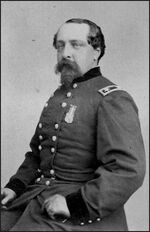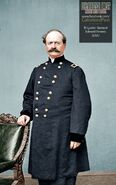
Edward Ferrero (18 January 1831 – 11 December 1899) was a Union Army Major-General during the American Civil War who rose from commanding the 51st New York Volunteer Infantry to commanding a division of African-American troops at the Siege of Petersburg; it was there that his reputation was ruined by his negligence during the Battle of the Crater.
Biography[]
Edward Ferrero was born in Granada, Spain on 18 January 1831, and he came from a family of recently-arrived Italian immigrants. In February 1832, his family emigrated to New York City, where Ferrero was raised. Edward took over his father's dance academy after his retirement, educating the wealthy and elite of New York society in the art of dance and becoming one of the United States' leading dance experts. Inspired by his uncle's service in the Crimean War and by his father's friendship with Giuseppe Garibaldi, Ferrero became the Lieutenant-Colonel of a New York militia regiment, and he used his dance academy skills to train them in parade ground precision and military drill. At the start of the American Civil War in 1861, he raised the 51st New York Volunteer Infantry at his own expense, and he led a brigade of three regiments at the Battle of New Bern in 1862, seizing the first Confederate redoubt to be captured in the war. In the summer of 1862, he and his brigade were ordered northward to Virginia, where they fought at the Second Battle of Bull Run and the Battle of Antietam. Ferrero's brigade stormed Burnside's Bridge, and his bravery was recognized when he was promoted to Brigadier-General. His first action as a general was the Battle of Fredericksburg in December 1862, and he later led his brigade with distinction at the Siege of Vicksburg in Mississippi in 1863. In 1864, following the Knoxville campaign, his brigade was transferred to the East again, and he took command of a division of African-American soldiers during the Siege of Petersburg. During the battle, he and Brig. Gen. James H. Ledlie remained in a shelter behind the lines of battle, sharing a bottle of rum as their divisions were destroyed by the Confederates. However, Ferrero was brevetted Major-General on 2 December 1864 and ended the war at Appomattox. After the war, he opened the world-famous Apollo Hall, which was converted into a theater in 1872 after he terminated his lease. He later became active in politics as a Tammany Hall Democrat, having leased the Hall's basement for his academy. He retired in May 1899 and died in December.

